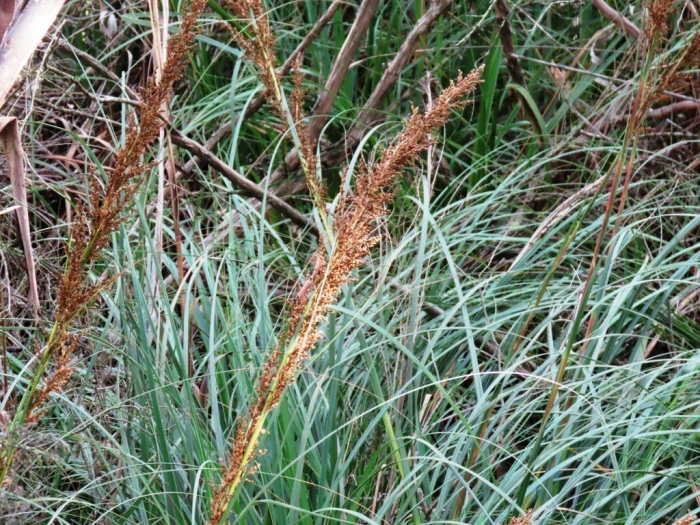Red-Fruit Saw-Sedge
(Gahnia sieberiana)
Red-Fruit Saw-Sedge (Gahnia sieberiana)
/
/

Elspeth Swan
CC BY 4.0
Image By:
Elspeth Swan
Recorded By:
Copyright:
CC BY 4.0
Copyright Notice:
Photo by: Elspeth Swan | License Type: CC BY 4.0 | License URL: http://creativecommons.org/licenses/by/4.0/ | Rights Holder: Elspeth Swan | Publisher: iNaturalist | Date Created: 2023-05-05T10:07:37-07:00 |

























Estimated Native Range
Summary
Gahnia sieberiana, commonly known as Red-fruit Saw-sedge, is a tussock-forming perennial herb native to a variety of habitats in Australia, including wet eucalypt forests, heathlands, and along stream banks from Tasmania to North Queensland. It can grow up to 6 feet 7 inches tall and is characterized by its rough, strappy leaves with serrated edges, which can cause skin irritation upon contact. The plant produces tall, black flower spikes that are not particularly showy, but they give way to shiny red or red-brown nuts that are quite distinctive and add to the plant’s ornamental value. Flowering typically occurs in spring and summer.
Red-fruit Saw-sedge is valued for its ability to stabilize soil with its dense root system, making it useful for erosion control. It is also appreciated for its textural foliage and the habitat it provides for various insect larvae, including those of the rare sword-grass brown butterfly. In cultivation, it prefers full sun to part shade and requires moist conditions, often found in clay and sandy soils with good drainage. It is suggested as a native alternative to the invasive Pampas grass in Australian landscapes. While it is generally low-maintenance, it can be affected by leaf spot diseases and may require occasional trimming to remove old foliage.CC BY-SA 4.0
Red-fruit Saw-sedge is valued for its ability to stabilize soil with its dense root system, making it useful for erosion control. It is also appreciated for its textural foliage and the habitat it provides for various insect larvae, including those of the rare sword-grass brown butterfly. In cultivation, it prefers full sun to part shade and requires moist conditions, often found in clay and sandy soils with good drainage. It is suggested as a native alternative to the invasive Pampas grass in Australian landscapes. While it is generally low-maintenance, it can be affected by leaf spot diseases and may require occasional trimming to remove old foliage.CC BY-SA 4.0
Plant Description
- Plant Type: Grass
- Height: 3.3-7 feet
- Width: 3.3-7 feet
- Growth Rate: Moderate
- Flower Color: N/A
- Flowering Season: Spring, Summer
- Leaf Retention: Evergreen
Growth Requirements
- Sun: Full Sun, Part Shade
- Water: Medium
- Drainage: Medium, Slow
Common Uses
Bank Stabilization, Bird Garden, Low Maintenance, Water Garden
Natural Habitat
Wet eucalypt forests, heathlands, and along stream banks
Other Names
Common Names: Red-fruit Sawedge
Scientific Names: , Gahnia sieberiana, Cladium tetragonocarpum, Gahnia arbuscula, Gahnia breviaristata, Gahnia radula var. oreogenes, Gahnia sieberiana var. arbuscula, Gahnia tetragonocarpa, Mariscus tetragonocarpus,
GBIF Accepted Name: